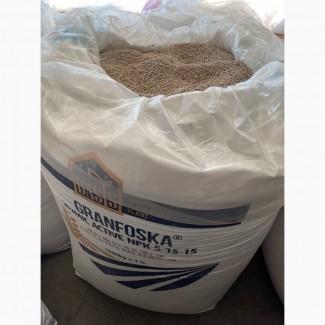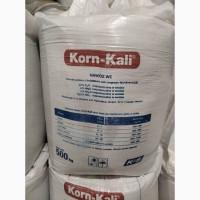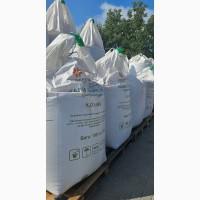Sell / buy
Npk 5:15:15 npk, Chernihiv region.
Price20,500 UAH.
Region:all of Ukraine,
Chernihiv region.
(Pryluky)
Updated:
What destination ?
1) Phosphorus-potassium mineral fertilizer with trace elements (P, K, Ca, Mg, B, S, Zn, Mo, Mn)
2) Meliorant of prolonged action (CaO content up to 35%)
5. Where and for what to use? – On all types of soil (including closed ones) for all agricultural crops (corn, beets, grain, vegetable and industrial crops, perennial grasses, fruit and berry plantations...). The greatest effectiveness is observed on acidic, marshy, sod-podzolic soils, as it reduces the harmful effects of acidity on plants and soil microorganisms.
6. How much and when to contribute? – Depending on the crop rotation, soil pH level and the degree of deficiency of phosphorus, potassium and trace elements in it, the recommended application rate is 0.15...0.35 t/ha. Applying is possible both in autumn and in spring (including - in combination with ammonium nitrate or urea, as well as with sulfur fertilizer "Wigor S-90" or ammonium sulfate - for crops that require a significant amount of sulfur - winter and spring rapeseed, sugar beets, potatoes...). Introduction is carried out both under the main culture and under the predecessor.
7. What to contribute? – 1) For the main cultivation of the soil or for the first cultivation - with the help of centrifugal spreaders of the type MVD-0.5 (НРУ-0.5), РУМ-5 (РУМ-8), etc. (0.2...0.35 t each /ha);
2) Together with the sowing of agricultural crops - with the help of seed drills and universal sowing units, as well as potato planters (0.15...0.2 t/ha each).
8. What will we get from the application?
1) Deacidification of the soil (bringing the pH level to 6.0-6.5), which significantly increases the level of assimilation of nutrients by plants, and therefore the effectiveness of applied fertilizers;
2) Ensuring sufficient plant nutrition with both macroelements (phosphorus and potassium) and microelements (magnesium, boron, sulfur, calcium);
3) Increasing the yield of agricultural crops by 15-20%;
4) Improving the quality of cultivated products (sugar content, gluten content, starch...);
5) Increasing winter and drought resistance of plants;
6) Creation of proper conditions for the vital activity of useful soil microorganisms (including nitrogen-fixing nodule bacteria), which, in turn, contribute to the release of nutrients available to plants;(//tractor-service.com)
7) Increasing the effectiveness of pesticides (especially -herbicides of the triazine group, which do not work at all when the acidity is рН≤5!).
9. What is the meaning of each of the components? - The composition offertilizers-meliorant includes the main elements of plant nutrients (NPK) and trace elements extremely important for the normal growth and development of plants - magnesium, boron, zinc, sulfur, manganese, molybdenum and calcium.
PHOSPHORUS is necessary for plants at all stages of development. The growth and development of plants, synthesis processes, the water regime of plants, and the accumulation of organic compounds in them depend on the level of phosphorus nutrition. Phosphorus starvation leads to deterioration of nitrogen nutrition.
POTASSIUM is especially important for the synthesis, exchange, transformation and movement of carbohydrates from the leaf surface of plants to their reproductive organs. Due to the lack of potassium in the soil, the entire nitrogen metabolism of plants is disrupted, growth processes are weakened, the intensity of photosynthesis processes decreases, and the quality of crop production deteriorates.
CALCIUM is simultaneously a deoxidizer for the soil and its structure-forming element, as well as a nutrient for plants, which participates in their hormonal reactions, the formation of cell walls, the movement of carbohydrates and the transformation of nitrogenous substances. Calcium ions promote the activity of soil microorganisms and earthworms, which accelerate the decomposition of organic substances. Lack of calcium affects the development of leaves and the root system of plants, causes physiological diseases (primarily - root crops).
MAGNESIUM is responsible for the formation of chlorophyll in the leaves of plants, significantly affects the formation of carbohydrates and their transportation from the leaves to the roots, as a result of which a powerful root system is formed, the concentration of sugars at the point of growth increases. It also activates the processes of converting phosphorus from mineral compounds into organic ones.
BOR contributes to the growth of vegetative organs and the strengthening of the root system of plants, the accumulation of sugars in the root neck and its increase; increases drought and winter resistance of plants; promotes pollination and flowering. It has the most significant effect of all trace elements on the yield and quality of agricultural crops. Its deficiency manifests itself in various plant diseases.
SULFUR affects the growth and development of stems in thickness, which helps to increase the frost resistance of plants. Externally, sulfur deficiency is similar to nitrogen deficiency and consists in retardation of plant growth, yellowing (chlorosis) of leaves, stretching and thinning of stems, deterioration of plant resistance to fungal diseases.
ZINC participates in protein, hydrocarbon, phosphorus metabolism, biosynthesis of vitamins and growth substances (auxins), increases frost resistance of plants. With a lack of zinc, the formation of sucrose, starch and auxins is delayed, the formation of proteins is disturbed, as a result of which non-protein nitrogen compounds accumulate in them and photosynthesis is disturbed. The process of cell division is inhibited, as a result of which the leaves are deformed and reduced, the growth of the plant is inhibited. Whitening or chlorosis of the upper leaves is noted in corn, twisting of leaves and petioles in tomatoes.
MOLYBDENUM is a component of some enzymes (aldehyde oxidase, hydrogenase, nitrate reductase), catalyzes the transition of nitrates into nitrites in plants and is present in all organs, including roots. Molybdenum is involved in the fixation of molecular nitrogen by nodule bacteria from the genus Rhizobium, is involved in phosphorus and protein metabolism, and in the creation of pectin. The lack of molybdenum leads to the accumulation of soluble nitrogen-containing compounds and inhibition of the creation of organophosphorus components in the plant. The acidic reaction of soils greatly reduces its mobility, and therefore its assimilation by plants.
MANGANESE takes part in exchange reactions of plant cells, in the processes of photosynthesis, creation of chlorophyll, protein metabolism, synthesis of vitamin C (ascorbic acid), increases sugar accumulation.
10. What soil acidity is optimal? - Unlike the existingcomplex fertilizers, Granfoskatm has remedial properties, thanks to which it quickly and effectively neutralizes excess soil acidity. After all, it is known that the slightly acidic reaction of the soil at pH=6.5 is considered
LLC "UKRAINIAN AGRICULTURAL GROUP"
Regional manager, Denis +38 096 773-01-49
e-mail: mineral.dobruvo@gmail.com
1) Phosphorus-potassium mineral fertilizer with trace elements (P, K, Ca, Mg, B, S, Zn, Mo, Mn)
2) Meliorant of prolonged action (CaO content up to 35%)
5. Where and for what to use? – On all types of soil (including closed ones) for all agricultural crops (corn, beets, grain, vegetable and industrial crops, perennial grasses, fruit and berry plantations...). The greatest effectiveness is observed on acidic, marshy, sod-podzolic soils, as it reduces the harmful effects of acidity on plants and soil microorganisms.
6. How much and when to contribute? – Depending on the crop rotation, soil pH level and the degree of deficiency of phosphorus, potassium and trace elements in it, the recommended application rate is 0.15...0.35 t/ha. Applying is possible both in autumn and in spring (including - in combination with ammonium nitrate or urea, as well as with sulfur fertilizer "Wigor S-90" or ammonium sulfate - for crops that require a significant amount of sulfur - winter and spring rapeseed, sugar beets, potatoes...). Introduction is carried out both under the main culture and under the predecessor.
7. What to contribute? – 1) For the main cultivation of the soil or for the first cultivation - with the help of centrifugal spreaders of the type MVD-0.5 (НРУ-0.5), РУМ-5 (РУМ-8), etc. (0.2...0.35 t each /ha);
2) Together with the sowing of agricultural crops - with the help of seed drills and universal sowing units, as well as potato planters (0.15...0.2 t/ha each).
8. What will we get from the application?
1) Deacidification of the soil (bringing the pH level to 6.0-6.5), which significantly increases the level of assimilation of nutrients by plants, and therefore the effectiveness of applied fertilizers;
2) Ensuring sufficient plant nutrition with both macroelements (phosphorus and potassium) and microelements (magnesium, boron, sulfur, calcium);
3) Increasing the yield of agricultural crops by 15-20%;
4) Improving the quality of cultivated products (sugar content, gluten content, starch...);
5) Increasing winter and drought resistance of plants;
6) Creation of proper conditions for the vital activity of useful soil microorganisms (including nitrogen-fixing nodule bacteria), which, in turn, contribute to the release of nutrients available to plants;(//tractor-service.com)
7) Increasing the effectiveness of pesticides (especially -herbicides of the triazine group, which do not work at all when the acidity is рН≤5!).
9. What is the meaning of each of the components? - The composition offertilizers-meliorant includes the main elements of plant nutrients (NPK) and trace elements extremely important for the normal growth and development of plants - magnesium, boron, zinc, sulfur, manganese, molybdenum and calcium.
PHOSPHORUS is necessary for plants at all stages of development. The growth and development of plants, synthesis processes, the water regime of plants, and the accumulation of organic compounds in them depend on the level of phosphorus nutrition. Phosphorus starvation leads to deterioration of nitrogen nutrition.
POTASSIUM is especially important for the synthesis, exchange, transformation and movement of carbohydrates from the leaf surface of plants to their reproductive organs. Due to the lack of potassium in the soil, the entire nitrogen metabolism of plants is disrupted, growth processes are weakened, the intensity of photosynthesis processes decreases, and the quality of crop production deteriorates.
CALCIUM is simultaneously a deoxidizer for the soil and its structure-forming element, as well as a nutrient for plants, which participates in their hormonal reactions, the formation of cell walls, the movement of carbohydrates and the transformation of nitrogenous substances. Calcium ions promote the activity of soil microorganisms and earthworms, which accelerate the decomposition of organic substances. Lack of calcium affects the development of leaves and the root system of plants, causes physiological diseases (primarily - root crops).
MAGNESIUM is responsible for the formation of chlorophyll in the leaves of plants, significantly affects the formation of carbohydrates and their transportation from the leaves to the roots, as a result of which a powerful root system is formed, the concentration of sugars at the point of growth increases. It also activates the processes of converting phosphorus from mineral compounds into organic ones.
BOR contributes to the growth of vegetative organs and the strengthening of the root system of plants, the accumulation of sugars in the root neck and its increase; increases drought and winter resistance of plants; promotes pollination and flowering. It has the most significant effect of all trace elements on the yield and quality of agricultural crops. Its deficiency manifests itself in various plant diseases.
SULFUR affects the growth and development of stems in thickness, which helps to increase the frost resistance of plants. Externally, sulfur deficiency is similar to nitrogen deficiency and consists in retardation of plant growth, yellowing (chlorosis) of leaves, stretching and thinning of stems, deterioration of plant resistance to fungal diseases.
ZINC participates in protein, hydrocarbon, phosphorus metabolism, biosynthesis of vitamins and growth substances (auxins), increases frost resistance of plants. With a lack of zinc, the formation of sucrose, starch and auxins is delayed, the formation of proteins is disturbed, as a result of which non-protein nitrogen compounds accumulate in them and photosynthesis is disturbed. The process of cell division is inhibited, as a result of which the leaves are deformed and reduced, the growth of the plant is inhibited. Whitening or chlorosis of the upper leaves is noted in corn, twisting of leaves and petioles in tomatoes.
MOLYBDENUM is a component of some enzymes (aldehyde oxidase, hydrogenase, nitrate reductase), catalyzes the transition of nitrates into nitrites in plants and is present in all organs, including roots. Molybdenum is involved in the fixation of molecular nitrogen by nodule bacteria from the genus Rhizobium, is involved in phosphorus and protein metabolism, and in the creation of pectin. The lack of molybdenum leads to the accumulation of soluble nitrogen-containing compounds and inhibition of the creation of organophosphorus components in the plant. The acidic reaction of soils greatly reduces its mobility, and therefore its assimilation by plants.
MANGANESE takes part in exchange reactions of plant cells, in the processes of photosynthesis, creation of chlorophyll, protein metabolism, synthesis of vitamin C (ascorbic acid), increases sugar accumulation.
10. What soil acidity is optimal? - Unlike the existingcomplex fertilizers, Granfoskatm has remedial properties, thanks to which it quickly and effectively neutralizes excess soil acidity. After all, it is known that the slightly acidic reaction of the soil at pH=6.5 is considered
LLC "UKRAINIAN AGRICULTURAL GROUP"
Regional manager, Denis +38 096 773-01-49
e-mail: mineral.dobruvo@gmail.com
Wholesale of mineral fertilizers.
The company has a wide range of products,
both domestic and foreign fertilizers
production Excellent quality. Certificates
quality Flexible prices. Shipping from the warehouse,
delivery to the farm and deliveries
wagon rates to the buyer's station.
Individual approach to each client.
Sales manager Denis Vitaliyovych
E-mail: mineral.dobruvo2@ukr.net
|
Store, contacts | |
Denys LLC "Ukrainian Agro-Industrial Group"/feedback, info. / activity evaluation | |
|
Phone:
+380xxxxxx
show
| |
| Telegram: 0967730149 | |
Ad ID: #571619
(added by a registered user, registration date: 09-01-2015)
Added / Updated: 09-19-2024 01:22 (current, until: 18-12-2024)
Permanent Ad Address:
Impressions / views for today: ?, total: ?






